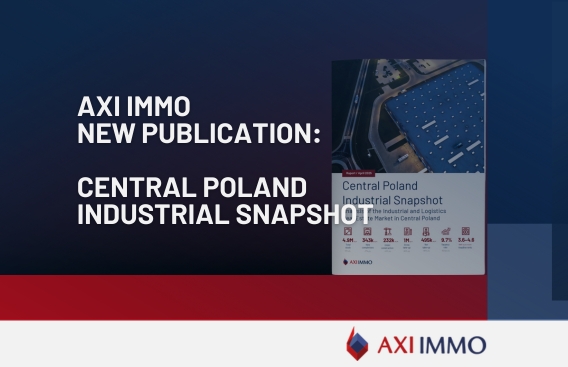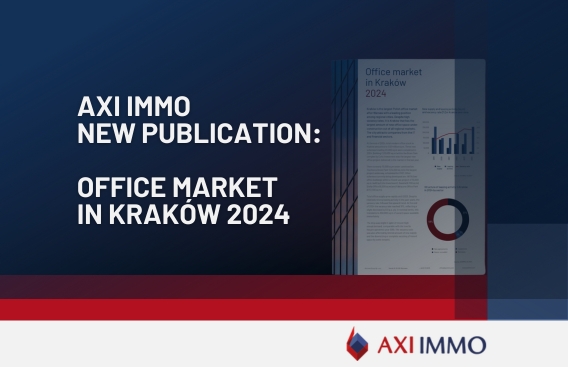Raport: The warehouse boom in Europe continues, Poland attracts with competitive prices – report Gerald Eve & AXI IMMO
Guide (2021) to the main warehouse and production markets in Europe in 2021 - Gerald Eve and AXI IMMO.

Advisory firm AXI IMMO in cooperation with its international alliance of partners Gerald Eve prepared the second edition of the guide to the European industrial and logistics real estate market. The report presents average prime rents in 80 locations within 20 European countries as well as yields in these markets. It also includes land prices in 53 key industrial and logistics locations. Poland remains one of the most attractively priced markets in Europe. Three out of five cheapest locations in terms of prime big box rents are in Poland. In addition, three Polish markets make the top 5 list of most attractively priced land markets in Europe.
Warehouses at the top of investors’ wish list
The European industrial and logistics market continues to enjoy strong investor demand as it remains the best perfoming sector of commercial real estate. Record levels of occupier activity combined with positive long term trends such as e-commerce and nearshoring make warehouses a safe haven for international capital.
Keen appetite for industrial and logistics assets has led to ongoing increases in transactional prices and in consequence – to yield compression in the majority of markets. The lower the yield, the higher the price that the vendor is able to secure in relation to the income stream generated by the asset. Logistics yields remain the lowest in the UK. In London, they stand at 3.25% net for the most attractive big boxes, which is 25 –50 basis points lower compared to the levels recorded at the end of 2020. Key German cities also fetch relatively low yields, at 3.6% to 3.8%, marking compression of 30-70 bps during H1 2021, depending on location. Warsaw, which is the most expensive Polish market, records net prime yields of approx. 5.3% – 20 bps less compared to the end of 2020.
„Yield compression within the warehouse sector across Europe is linked to the rising significance of this part of the real estate market. The pandemic accelerated this structural shift, with rapidly growing e-commerce driving demand for warehouse space even higher. We currently observe a rising number of acquisitions at early stages of the development proces, with few or no pre-let agreements in place. Poland is a good example. Schemes remaining under construction attracted a particularly high share of capital since the start of the pandemic. Year 2020 was record high in terms of transactional activity in Polish warehouses, with assets valued at a total of EUR 2.6 bn changing hands. This demonstrates high investor confidence in the Polish market”, comments Renata Osiecka, Managing Partner, AXI IMMO.
Affordable rents in Polish warehouses
Average headline rents for modern big box schemes are relatively similar in key Polish markets. They stand at around EUR 3.2 – 3.6 per sqm in Poznań, EUR 2.9-3.6 in Central Poland, EUR 3.2 – 3.6 in Upper Silesia, EUR 3.3 – 3.7 in Lower Silesia and EUR 3.3-3.9 in Warsaw. These are some of the lowest rates in all of Europe. According to Gerald Eve data, three of the five cheapest big box markets are in Poland.
In comparison, prime big box rents in Poland’s western neighbour – Germany – stand at EUR 5.5-6 in the cheapest of the markets included in the analysis – Rhineland (with cities of Cologne and Dusseldorf). In the most expensive German market – Munich – A-class big box assets fetch as much as EUR 6.8-7.2 per sqm. There is an even wider gulf between Poland and the United Kingdom and Scandinavia. The most expensive location included in the report – Greater London – records rents of EUR 15.8 per sqm for prime big boxes. Top five most expensive locations also comprises the South-East region of England, followed by Oslo, Helsinki and Stockholm.
Poland is attractive also when looking at smaller urban logistics assets. All main Polish warehouse markets except for Warsaw make the top 10 ranking of the cheapest urban logistics markets. Warsaw achieves much higher rents compared to other Polish cities due to higher levels of wealth, more widespread online retail, as well as fierce competition for urban land from other sectors of real estate. Last mile rents in Warsaw are between EUR 4.5 and 5.25 per sqm. It is still attractive in relation to Western European markets, especially London, where they are five times higher (between EUR 16 and 26). Last mile rents in the main German cities stand at EUR 8.2-8.5 in Munich, EUR 7.5-8 in Berlin, EUR 7.2-7.5 in Frankfurt and EUR 6.7-7 in Cologne/Dusseldorf. Meanwhile, occupiers interested in taking prime urban logistics space in the Paris region need to pay rents of around EUR 7.1-8.3.
Apart from the fast-growing domestic e-commerce sector and recovering household consumption following the pandemic, the Polish warehouse market is also driven by demand from abroad. The country’s strategic location within Europe and attractive rents, as well as relative ease of securing land for warehouse developments encourage a number of international players to establish their European distribution hubs in Poland. Amazon and Zalando already have a well-developed international logistics infrastructure in our country. In addition, a new Amazon distribution hub with an area of approx. 200,000 sqm is currently under construction in Świebodzin, Western Poland. Moreover, construction of an 80,000 sqm logistics centre dedicated to serving online orders placed by Czech consumers broke ground near Gorzyce, by the Polish southern border, in Q2 2021.
„Poland has for some years now been a first point of entry for a high number of international firms setting up their European supply chains. The scale of this trend can be measured by total space leased for international distribution in the last several years. Cross-border e-commerce and nearshoring have additionally boosted the significance of Poland as a hub for European distribution. International firms are attracted by a favourable business enviornment, tax incentives, experienced and skilled workforce, as well as continuously improving transport infrastructure, a strategic location within Europe and the EU membership. Poland also offers a modern and relatively new warehouse stock compared to Western Europe and a high number of new schemes are added every year. Finally, the Polish market continues to compete thanks to attractive rental rates. These have been stable throughout the pandemic, in contrast to many Western European markets, where sharp increases have been recorded. We now expect rental growth to arrive in Poland too, albeit with no impact on the relative attractiveness of the market for occupiers”, sums up Renata Osiecka.
Poland offers better access to investment land
The Polish market stands out from the rest of Europe when it comes to the supply of good quality land for warehouses, as well as its attractive price. This, combined with low labour costs and a straight forward land development process, has led a growing number of logistics and production firms to establish their European distribution and manufacturing hubs in Poland. A high number of these schemes is located near the western and southern borders. For example, the aforementioned decision by an international e-commerce retailer to build a distribution hub servicing the Czech market near the souther border is in large part a result of a highly limited investment land offer in Czechia, as well as a complicated and protracted land development process in this country.
The guide prepared in cooperation with Gerald Eve includes information on transaction prices for investment plots in key logistics locations in 53 markets. Poznań is the cheapest of all markets included in the report, followed by Upper Silesia, the Portuguese region of Palmela/Setúbal, the Czech Usti nad Labem and Central Poland.
„A wide variety in pricing of investment land between Poland and other European countries is a result of high supply of good quality plots and the terrain, with lowlands accounting for more than 75% of land. In addition, relatitvely simple and short administrative procedures related to real estate development play a role. Although land prices for warehouse and residential projects have increased since the start of the pandemic, this has not negatively affected development activity in those two segments of Polish real estate”, adds Renata Osiecka.
ABOUT AXI IMMO
AXI IMMO offers commercial real estate advisory services in the areas of leasing and management of office and industrial space as well as acquisition and disposal of real estate assets and development land. The company also offers B2B and B2C supply chain management services. AXI IMMO’s biggest advantage is combining international standards of service with a thorough knowledge of the local market. The company received the award for the Best Local Agency in 2012-2019 and the Best Team for the industrial sector in 2016-2017 in the prestigious CiJ Awards organised by the CEE CiJ Journal magazine.
ABOUT GERALD EVE
The Gerald Eve International Alliance has over 25 members, including 21 in Europe, who cover all aspects of the industrial and logistics sector. All partner firms have been carefully chosen based on expertise, reputation and professional relationships between partners. The Alliance offers clients the flexibility of working with the best in each territory, without bounding them to one advisor, and provides them access to the members’ extended professional networks.
Recent articles
14 April 2025
New Work expands in Warsaw with new serviced offices space at Metron building, AXI IMMO advises
Serviced offices at New Work in Warsaw, just steps away from Metro Wierzbno station.
9 April 2025
Central Poland Industrial Snapshot – Analysis of the industrial and logistics real estate market in Central Poland, AXI IMMO publication
High industrial take-up in Łódź region in 2024 driven by lease renewals
3 April 2025
AXI IMMO presents its analysis of the industrial & logistics market in Małopolska, southern Poland
Małopolska on developers' spotlight: more space for industrial and logistics on the horizon.
24 March 2025
Office market in Kraków 2024, Poland, publication by AXI IMMO, 2025 March – Analysis, trends, forecasts
Kraków is the leader of regional office markets – tenant activity is growing. AXI IMMO's special publication on Office market in Krakow in 2024, Poland includes an analysis of supply, demand, rental rates, as well as trends and forecasts on the Krakow office market in 2025 and 2026.



